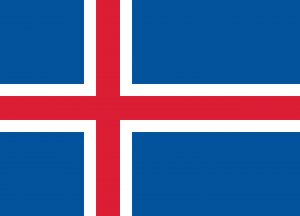Language/Icelandic/Vocabulary/Weather-Vocabulary
| ◀️ Prepositional Phrases — Previous Lesson | Next Lesson — Seasons and Months ▶️ |
Weather is an essential part of everyday life, and it's no different in Icelandic. The country's location in the North Atlantic ensures that Icelandic weather is unpredictable and can change rapidly. Learning Icelandic weather vocabulary is essential for understanding weather conditions and forecasting changes. In this lesson, we will explore common Icelandic weather vocabulary and phrases. By the end of this lesson, you will be able to understand Icelandic weather reports and discuss weather conditions with locals.
Basic Weather Phrases
Before diving into Icelandic weather vocabulary, let's review some basic weather phrases:
- Hvernig er veðrið? - What is the weather like?
- Veðrið er gott - The weather is good.
- Veðrið er slæmt - The weather is bad.
- Það er kalt - It is cold.
- Það er heitt - It is hot.
- Það er rigning - It is raining.
- Það er snjókoma - It is snowing.
- Það er vindur - It is windy.
Temperature
Icelandic temperature is measured in Celsius (Celsíus) and sometimes Fahrenheit (Fahrenheits). Below are some common Icelandic weather vocabulary related to temperature:
| Icelandic | Pronunciation | English |
|---|---|---|
| hitastig | ['hɪtaˌstɪk] | temperature |
| hiti | ['hiti] | heat |
| kuldinn | ['kʏltɪn] | chill |
| frost | ['frɔst] | frost |
| hiti- og köldublær | ['hiti ɔɣ kœltʏˌplai:ɾ] | heatwave and cold snap |
| >n mínusgráða | [hɛr tʏ: 'nuːsɡraːða] | below zero |
- Note: In Icelandic, the suffix "inn" is often added to nouns and adjectives to indicate a definite article.
Examples
- Það er þrjátíu gráður - It is thirty degrees.
- Það er mjög heitt á daginn í dag - It is very hot today.
Precipitation
Icelandic weather is highly unpredictable and can bring different forms of precipitation. Below are some common Icelandic weather vocabulary related to precipitation:
| Icelandic | Pronunciation | English |
|---|---|---|
| úrkoma | ['ʏrk'homa] | precipitation |
| regn | ['rɛkn̥] | rain |
| snjór | [snjou:r] | snow |
| höggregn | ['hœɣrɛkn̥] | sleet |
| hálsregn | ['hau:lsrɛkn̥] | drizzle |
| rigning | ['rɪŋktn̥] | rainfall |
| þrumuveður | ['θrʏ:mʏ'vɛˌðʏr] | thunderstorm |
| haglél | ['haklei:l] | hail |
Examples
- Það er draga á við úrkomu - There is a storm brewing.
- Það er að rigna - It is raining.
- Það er hálsregn í dag - It is drizzling today.
Wind
Icelandic weather can be very windy, especially along the coasts. Below are some common Icelandic weather vocabulary related to wind:
| Icelandic | Pronunciation | English |
|---|---|---|
| vindur | ['vɪntʏr] | wind |
| vindstyrkur | ['vɪnts'tɪrkʏr] | wind speed |
| logn | ['loukn̥] | calm |
| rok | ['rɔːk] | gust |
| stormur | ['stwrmʏr] | storm |
| pólskur vindur | ['poulskʏr 'vɪntʏr] | polar wind |
Examples
- Það er sterkur vindur í dag - It is a strong wind today.
- Stormur er á leiðinni - Storm is coming.
Weather Phenomena
Icelandic weather is well known for its unique weather phenomena. Below are some common Icelandic weather vocabulary related to these phenomena:
| Icelandic | Pronunciation | English |
|---|---|---|
| sólríki | ['soːlri:kɪ] | sunshine |
| ský | [skʏː] | cloud |
| regnbogi | ['rɛknbɔ:i] | rainbow |
| Þrumuveður | ['θrʏ:mʏvɛˌðʏr] | thunderstorm |
Examples
- Sólríkt dagur - Sunny day
- Það er regnbogi á lofti - There is a rainbow in the sky.
- Þrumuveður er yfir höfuðborginni - Thunderstorm above the capital city.
Seasons and Months
Below are the Icelandic words for the four seasons and twelve months of the year:
| Icelandic | Pronunciation | English |
|---|---|---|
| vetrarins | ['vɛtrarɪns] | winter |
| vorins | ['vɔrɪns] | spring |
| sumars | ['sʏm:ars] | summer |
| hausts | ['hœysts] | autumn |
| janúar | ['janu:ar] | January |
| febrúar | ['fɛbrua:r] | February |
| mars | [mars] | March |
| apríl | ['apr'i:l] | April |
| maí | [ma:i] | May |
| júní | ['junii] | June |
| júlí | ['ju:li] | July |
| ágúst | ['au:gʏst] | August |
| september | ['sɛptɛmbɛr] | September |
| október | ['ɔkʏto:bɛr] | October |
| nóvember | ['no:ᵹvɛmbɛr] | November |
| desember | ['dɛsɛmbɛr] | December |
Examples
- Vetrarins fyrsti mánuður er janúar - The first month of winter is January.
- Sumarsólstöður er í júni - Summer solstice is in June.
Conclusion
In this lesson, we have explored common Icelandic weather vocabulary and phrases. Icelandic weather is highly unpredictable, so learning weather vocabulary is vital for understanding weather reports and forecasts. We have covered basic weather phrases, temperature, precipitation, wind, and weather phenomena. Additionally, we have learned the words for the four seasons and twelve months of the year. By mastering Icelandic weather vocabulary, you will be able to discuss weather conditions in Iceland with locals and make the most of your Icelandic experience.
Videos
Icelandic Tongue Twister - Bad Travel Weather [EP.31] - YouTube
Other Lessons
- Introducing Yourself
- Food
- Directions and Locations
- How to Say Hello and Greetings
- Daily Routine
- Restaurant
- Geography
- Health
- traveling or buying
- Holidays Þegar maður óskar einhverjum einhvers
Sources
- Icelandic vocabulary - Wikipedia
- Level 18 - Weather - Icelandic Vocabulary and phrases - Memrise
- Icelandic Weather Expressions - ielanguages.com
| ◀️ Prepositional Phrases — Previous Lesson | Next Lesson — Seasons and Months ▶️ |

